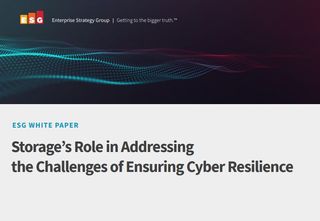Organisations are scaling back their open source software due to security fears – Anaconda
Latest report reveals that 40% of professional respondents dialled back usage in the last year, while talent shortages and education remain top concerns

Growing security fears around open source software are causing organisations to reduce their usage, the latest research from data science platform provider Anaconda has found.
The firm’s annual 2022 State of Data Science report dives into the widespread trends, opportunities, and perceived barriers facing the data science, machine learning (ML), and artificial intelligence (AI) industries.

Storage's role in addressing the challenges of ensuring cyber resilience
Understanding the role of data storage in cyber resiliency
The study surveyed 3,493 academics, industry professionals, and students, from across 133 countries between April 25, 2022, and May 14, 2022.
It revealed that open source security continues to be a dominant concern in the wake of incidents such as the Log4j breach and the rise of protestware over the last year.
In fact, 40% of professional respondents said that their organisations scaled back their open source software usage over the last twelve months, while 31% of professionals stated that security vulnerabilities are the number one challenge in the open source community.
Although most organisations use open source software, 8% are not. Of that small group, 54% said the biggest reason is fear of potential vulnerabilities, exposures, or risks – a 13% increase over last year’s report, Anaconda said.
The data also revealed that organisations remain concerned about industry talent shortages. According to the report, 90% of professional respondents highlighted their concern over the potential impact of a talent shortage, with 64% saying they were most concerned about their organisation’s ability to recruit and retain technical talent.
Channel Pro Newsletter
Stay up to date with the latest Channel industry news and analysis with our twice-weekly newsletter
Additionally, 56% said that insufficient talent is one of the biggest barriers to the successful adoption of data science.
However, Anaconda’s SVP of Operations Jessica Reeves said the pool of talent can grow to meet the numbers required across the industry.
“With data scientists continually cited as one of the best careers in the U.S., the pool of talent is sure to catch up to the demand,” she said. “Solutions proving successful to help close this gap include upskilling existing workforces and permitting stronger remote work options.
“Organisations should bolster the tools and resources available for continued learning, and academic institutions should fill in the skills gaps for students and turn them into strengths as they prepare to enter the workforce.”
The report also found that ethics, bias, and regulation require more attention – especially in education. 90% of professional respondents said the government should play a larger role in strengthening technological innovation and manufacturing, while 70% said they would support more funding for STEM and tech-based schooling.
Currently, only 19% of student respondents are learning ethics in AI/ML/data science lectures, the data revealed, while 32% have never been taught bias in those classes.
Anaconda said the finding highlights the need for educational institutions to adjust learning paths to suitably prepare those entering the workforce.
“It’s incredible what the community has achieved over the past decade alone. Many companies wouldn’t exist without the open source foundations they’re built on today,” commented Anaconda CEO and co-founder Peter Wang.
“But to tackle these challenges successfully and continue innovating the future enterprise, we must keep reinvesting in the open source community and its infrastructure. I’m hopeful about where the industry’s priorities rest and the next generation of talent entering the workforce.”
Dan is a freelance writer and regular contributor to ChannelPro, covering the latest news stories across the IT, technology, and channel landscapes. Topics regularly cover cloud technologies, cyber security, software and operating system guides, and the latest mergers and acquisitions.
A journalism graduate from Leeds Beckett University, he combines a passion for the written word with a keen interest in the latest technology and its influence in an increasingly connected world.
He started writing for ChannelPro back in 2016, focusing on a mixture of news and technology guides, before becoming a regular contributor to ITPro. Elsewhere, he has previously written news and features across a range of other topics, including sport, music, and general news.





